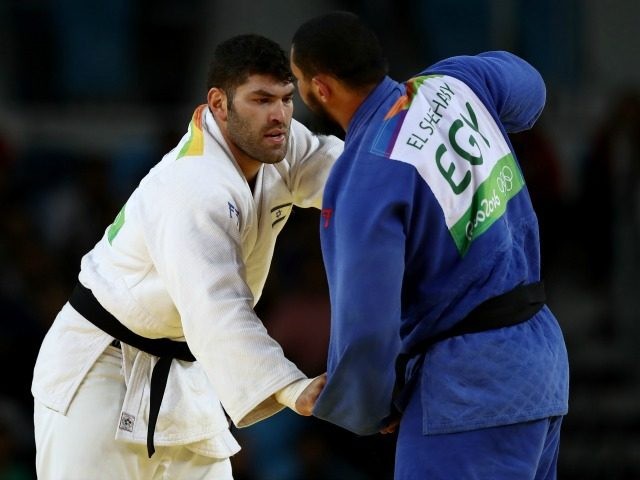TEL AVIV – The Egyptian press has come out against the handshake snub by their country’s judoka, saying the Olympic athlete’s refusal to shake his Israeli opponent’s hand shows Egypt to be a “diseased culture” and only served the “Zionists” who leveraged the incident to portray Egyptians as “extremists and uncultured.”
The incident was further compounded by the fact that the Egyptian contender, Islam El Shehaby, suffered a “humiliating” loss, the reports said.
The articles, translated by the Middle East Media Research Institute (MEMRI), slammed El Shehaby for ignoring pressure from anti-normalization proponents in Egypt and going ahead with the bout against Israeli judoka Or Sasson.
Writing in Al-Ahram, Egypt’s largest news outlet, Hussein Al-Zanati said that El Shehaby’s refusal to shake hands with Sasson “sent the world a negative message about Egyptian athletes, which was leveraged by the global Zionist propaganda machine to portray us all as extremists, uncultured, and unsportsmanlike.”
After being defeated by Sasson, El Shehaby snubbed the Israeli athlete’s proffered hand and left the arena amid boos from the crowd, before the referee ordered him back to take a bow in accordance with the rules of judo.
Days before the bout, Moutaz Matar, a TV host of the Islamist-leaning network Al-Sharq, had urged El Shehaby to withdraw.
“My son, watch out. Don’t be fooled, or fool yourself, thinking you will play with the Israeli athlete to defeat him and make Egypt happy,” he said. “Egypt will cry; Egypt will be sad; and you will be seen as a traitor and a normalizer in the eyes of your people.”
In his August 15 article, Zanati also made reference to Shehaby’s shaky policy of normalization.
“The question is: If Islam El Shehaby truly opposes normalization with the Zionists, why did he agree to fight the Israeli in the first place? And if he did so out of a desire to wage jihad against an ‘enemy’ and defeat him, then why wasn’t he better prepared to win?”
“Should we cheer for him when he chose normalization with the Israeli enemy?” he added.
Zanati concludes that it would have been “more honorable” for Egypt had the judoka refused to participate.
“But to choose to compete, to suffer a humiliating loss, and then to want to become a popular hero [by refusing to shake hands] – this is the embodiment of shame and an insult to our intelligence. Heroism means having principles and defending them, rather than trying to mock everyone and play both sides.”
Similarly, Egyptian intellectual Mamoun Fandy attacked El Shehaby for his refusal to shake hands in the London-based daily Al-Sharq Al-Awsat, arguing that the incident only served Israel:
“This refusal to shake hands produced a saying which has become one of Israel’s best propaganda messages: ‘Losing doesn’t make you a loser but hate makes you a loser.’ [With this] as proof, pro-Israel media have succeeded in portraying us as a culture of hatred,” he writes.
Fandy lambastes elements of the Egyptian public who chose to cheer Shehaby on despite his defeat, arguing that portraying defeats as victories is part of a larger “virus” in which “delusional” Arabs present illusions as reality.
“This phenomenon is the most dangerous virus, which will quickly make Egypt not only a failed country, but a failed culture,” he writes.
Fandy calls Judoka-gate “a double defeat.” The first is “the defeat of a judoka who should have accepted his loss and not politicized it, and second, the propaganda defeat, which cost Israel no effort at all to achieve.”
Fandy also comments on the fact that “300 million Arabs were unable to produce a winner of medals like France, which has a population of no more than 70 million.”
(Fandy is wrong in that there have been a handful of Arab medalists in Rio this year, including the Moldovan-born Emirati judoka Sergiu Toma who won the bronze for the men’s 81 kg.)
“The first step in treatment is to diagnose the disease. We are undoubtedly a diseased culture,” Fandy concludes.
Immediately following the incident, Egyptian journalist Galal Nassar wrote: “As long as you agreed to play an Israeli champion in the Olympics, you should have exchanged the greeting.”
He contended that Shehaby’s move backfired, and the Israeli player ended up with more sympathy. “We have lost in terms of sports and politics,” Nassar said.

COMMENTS
Please let us know if you're having issues with commenting.